CLAS 353
December 3, 2024


L: Kratzenstein, Orpheus and Eurydice (1806); R: Stanhope, Orpheus and Eurydice (1878)
Creative Project #2 (due Friday, December 6)
Response #2 (due, Wednesday, December 11)

Philosophical underpinning of Ovid's Metamorphoses: long speech of Pythagoras (6th century BCE philosopher, migrated to Italy; metempsychosis), “Everything changes; nothing dies” (15.165), “All things are in flux” (15.178) – cf. Heraclitus (fl. ca. 500 BCE)
Metamorphoses 15.215ff. (Pythagoras's speech: change/shifting appearances/instability of world)
“Our own bodies always and without rest
are also changing, nor what we were or are
will we tomorrow be . . .
. . . The shape of nothing abides, and she who renews
all things, Nature, remakes new forms from other forms,
and nothing in the world, believe me, completely dies,
but rather changes and renews its appearance. Being born
is called the beginning of something other than what was before,
and dying, ceasing to be the same.”

- Pythagoras's application of change principle to city-states/empires (e.g. Troy): "Tradition has it, too, that Dardanian Rome is now on the rise, / which next to Apennine-born Tiber’s waves / beneath her great mass is laying the foundations of the world: / she changes her shape by growing and one of these days / will be the head of the boundless globe!", 15.431-5 (cf. Roma aeterna, "For them I will not limit time or space. / Their rule will have no end", Aeneid 1.278-9)
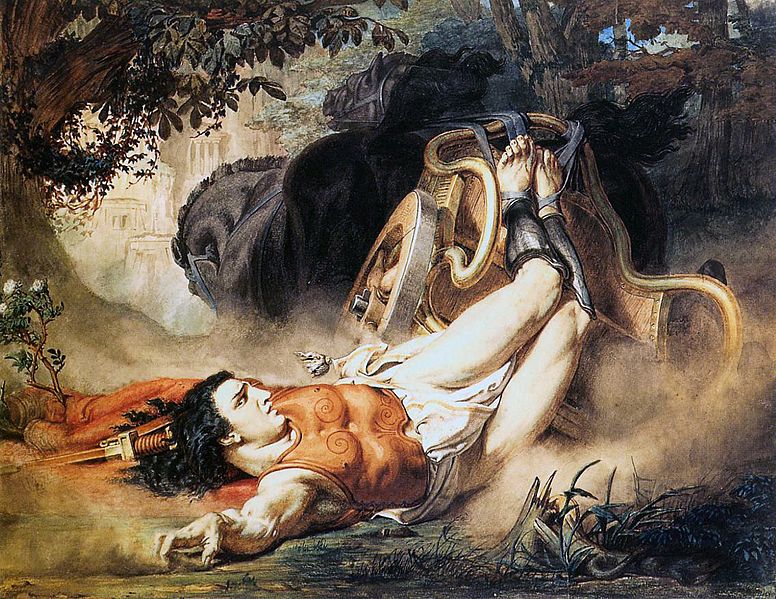
Alma-Tadema, The Death of Hippolytus (1860)
- Metamorphoses (end): apotheosis as final metamorphosis (Ovid's "immortality") – transition through Hippolytus's fantastical Italian story (Phaedra & violent death, resurrected by Aesculapius/Asclepius, Diana's intervention) > Virbius ("a minor god", 15.545)
Alison's "Wanting Someone too Close" (Byblis & Caunus, Myrrha, Hippolytus) & "Switching" (Tiresias, Iphis & Ianthe, Orpheus & Eurydice, Caenis): crossing kin boundaries, exploring sexuality & gender beyond heteronormativity & cisnormativity
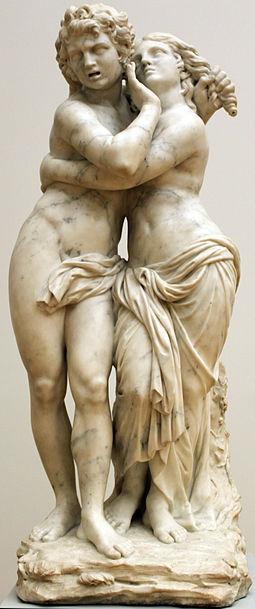
Delvaux, Byblis and Caunus (1734)
- Byblis & Caunus: sibling incest (twins) – obsessive & clever Byblis uses language to change kin-relationship ("She starts calling him sir, hates her family name, / and wants him to call her Byblis, not sister", 9.466-7; "if I could just change my name and be with you", 9.487) > wax tablet/letter to persuade Caunus ("Love is spontaneous for people our age! / We don't know what's allowed because everything / should be—we make ourselves in the image of gods", 9.553-5)
Metamorphoses 9.601-9 (Byblis regrets written letter vs. live performance)
“I should have just spoken, confessed my tormented
feelings in person, not fixed myself in wax.
He’d have seen my tears, seen the face of his lover,
and I could have said more than tablets can hold.
I could have thrown my arms around his tense neck,
and if he said no, I could have looked set to die,
collapsed at his feet, and pleaded for my life.
I should have done all of that! Each act alone might
not have swayed him, but all together they could.”
_-_Biblis_(1884).jpg)
Bouguereau, Byblis (1884)
- direct approach: tragically doomed desire – Caunus flees, Byblis pursues; metamorphosis ("the Naiads gave her a vein of fresh tears / that would never go dry", 9.657-8)?
- Myrrha & Cinyras (grandson of Pygmalion & ivory girl): Orpheus's Orientalizing tale, "I praise the people of Thrace . . . this land that's far from those that bred / something so obscene" (10. 305ff.; cf. Thracian Tereus tragedy)
- obsessed Myrrha rationalizes impossible desire (". . . animals mate without such distinction . . . They're so lucky, so free! Civilized humans / have made nasty rules: what nature allows / jealous laws forbid . . . But I've heard of places / where son sleeps with mother . . .", 10.323ff.), but attempts suicide (nurse)
- grim & grotesque ironies of language, tragic horror of incest (cf. Oedipus):
Metamorphoses 10.460-70 (nurse delivers Myrrha)
The closer to ruin she is, the more shocked—she's
sorry she dared this, wants to stop while still unknown
and pulls back—but the old woman leads her by the hand
to the bed, whispers, "Take care, Cinyras, she's
yours," and presses the doomed bodies togther.
Then the father pulls into bed his own child,
obscene, and soothes the girl’s worries, comforts her fears.
Maybe, she’s so young, he calls her Baby; maybe
she calls him Daddy too—so names will seal the crime. [filia/ pater]
Then, full of her father, the girl slips away, evil
seed between her cursed legs: the sin is now made flesh.
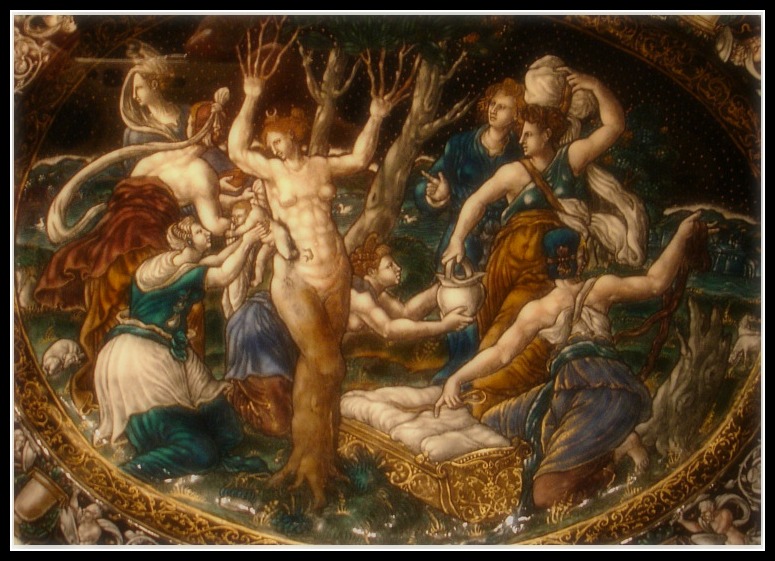
de Court, Myrrha assisted by Lucina, the Goddess of Birth (1560)
- Myrrha's flight from Cinyras & metamorphosis ("change me: deny me both life and death", 10.487) by "some god"? Myrrha mother of Adonis
- Iphis & Ianthe ("switching"): Iphis (m./f. name), gender fluid girl dressed as boy by Telethusa ("whether you saw boy / or girl in the face—each way, it was exquisite", 9.712-13) & betrothed to Ianthe (mutual desire, "girl burning for girl", 9.725)
- Iphis sees nature as against her (9.726ff.), gender/sex impossible obstacle to marriage (9.750ff.): Telethusa's prayer & Isis's gender-affirming intervention
Metamorphoses 9.786-91 (Iphis's transformation)
The goddess seemed to nudge her altar (it jiggled!),
the temple doors rattled, her moonlike horns glowed,
and the cymbals jangled—yes, you could hear them.
Not sure yet but happy with these promising signs
Telethusa leaves the temple. Iphis goes, too,
but with a longer stride than usual, with cheeks
less pale and limbs more strong and a face that seems
tougher and hair that’s grown tousled and short,
plus more forcefulness than a girl’s likely to have.
The girl you were is a boy!
- Caenis: 200 yrs old Nestor's story of physical invulnerability (cf. impenetrable Cycnus's slaying by Achilles in Trojan War)
- Caenis ("Thessaly's most gorgeous girl", 12.190) resists marriage – Ovid's story of female wish-fulfilment?
Metamorphoses 12.201-9 (Neptune forced to grant Caenis's wish of impenetrability)
“This outrage,” said Caenis, “makes me wish really hard
not to bear it again. Change me from a girl:
you’ll grant what I want.” The last words were uttered
in such a deep tone, the voice seemed like a man’s—
and it was. For the god of the sea had granted
the wish and done more: Caeneus could not be hurt
by a stabbing and would never fall to a sword.
Caeneus left, glad with his gift, and spent his life
in manly pursuits, roaming the fields of Thessaly.
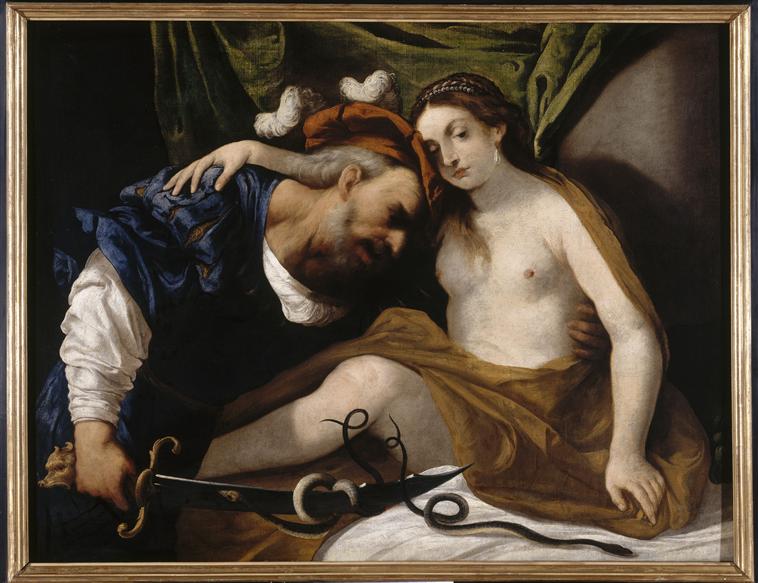
della Vecchia, Tiresias Transformed into a Woman (ca. 1650)
- Tiresias's "switching" (Theban book, short story post-Semele): "he'd known both sides of love" (3.323) – metamorphoses & compensation for blindness (Juno & Jupiter)?
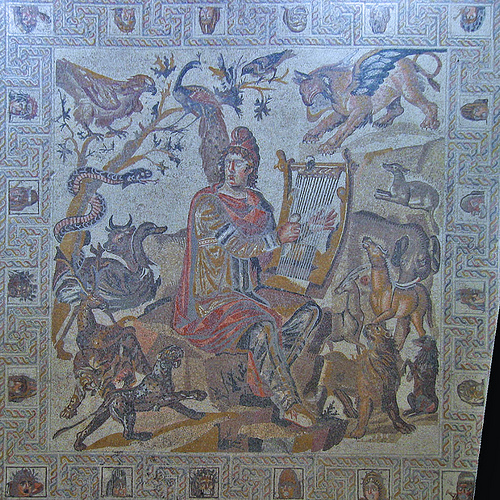
Orpheus charms the wild beasts (Roman mosaic, ca. 350 CE)
- Orpheus & Eurydice: wedding of Orpheus (son of Calliope) & Eurydice; poetic/erotic katabasis & Eurydice's two deaths (desire do-over fails)
Metamorphoses 10.24ff. (Orpheus's song to Dis and Proserpina)
“I’ve come for my wife, who stepped on a poisonous
snake and was bitten, plucked just as she bloomed.
I wanted strength to endure and truly have tried—
But Amor’s won . . .
. . . We are all consigned to you. We might delay,
but sooner or later we stream to one place;
we wend this way, it's our final abode—
your domain over us mortals lasts longest.
When she's old and has traveled her share of years,
you will have her, too; I want only a loan.
But if fate won't grant me my wife's release, I will not
go back myself. Be glad for the deaths of us both."
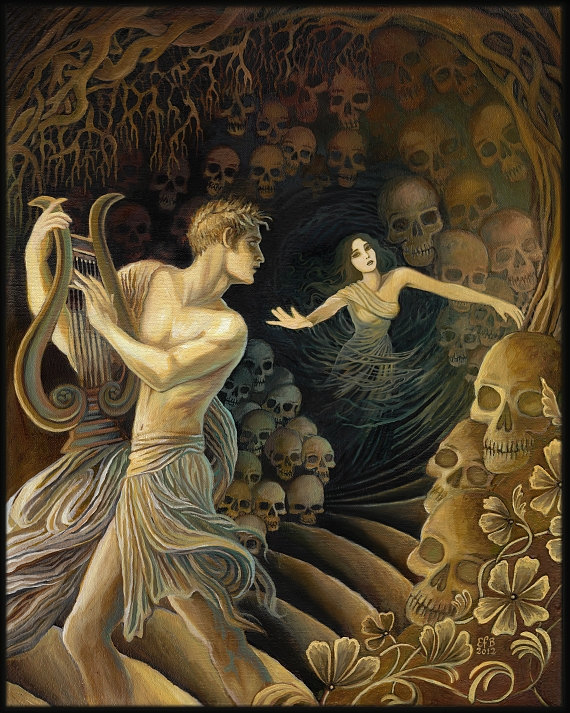
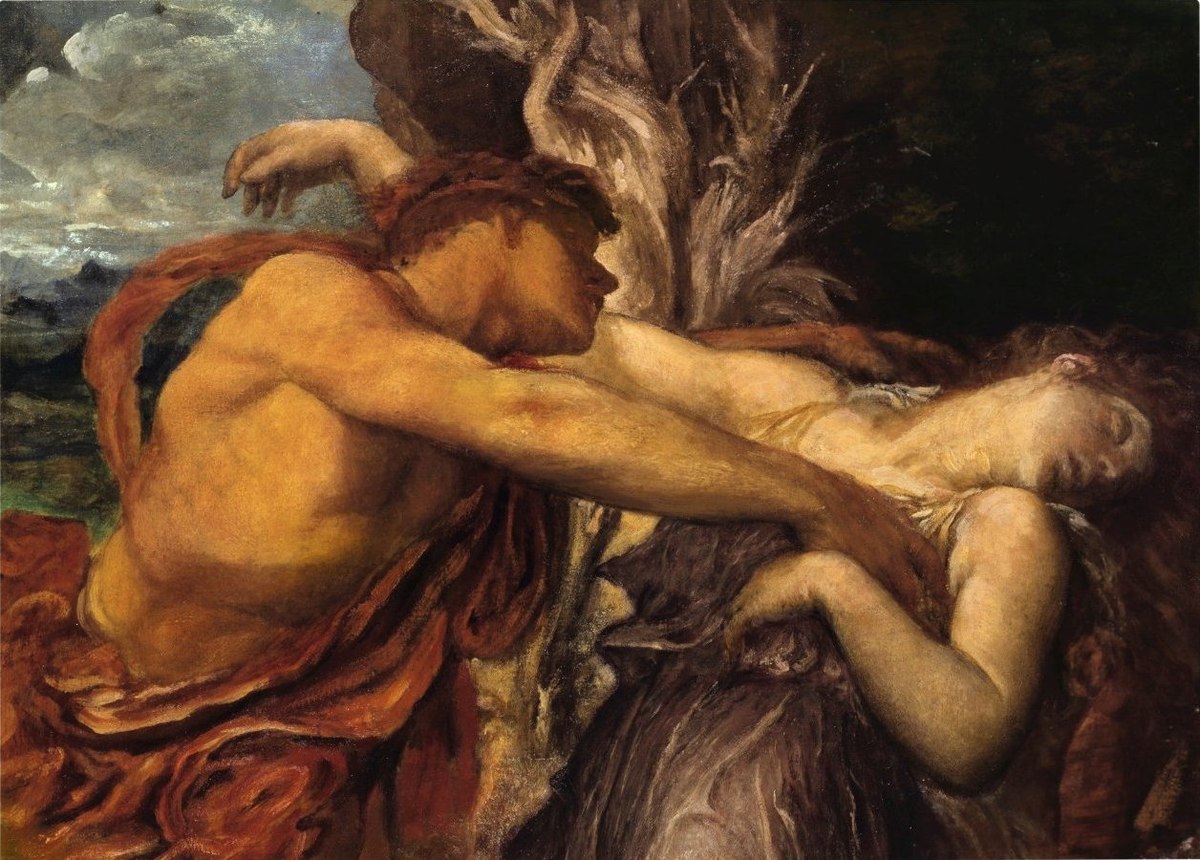
L: Balivet, Orpheus and Eurydice (2012); R: Watts, Orpheus and Eurydice (ca. 1870)
- love song prevails: all suspended in Hades, "[Eurydice] came she dragged her swollen foot" (10.49)
Metamorphoses 10.55-63 (successful Orpheus forgets prohibition)
They had almost reached the Upperworld’s rim
when, loving and anxious that she’d slipped, he needed
to see her so turned his eyes. At once she sank back—
arms flung out straining to catch or be caught—
in anguish he gasped only intangible air.
Dying again she blamed her husband for nothing
(blame him for what—having loved her so much?)
and she called a last “farewell” that barely brushed
his ears, then dissolved into what she had been.
- Orpheus rejects women & invents pederasty (aetiology): "he was first to show Thracian men how . . . to pluck those first flowers, the quick spring of youth", 10.84-5; dismembered by Maenads; reunited with shade of Eurydice in underworld (11.1-85) – tragedy of human desire, love/desire & death?
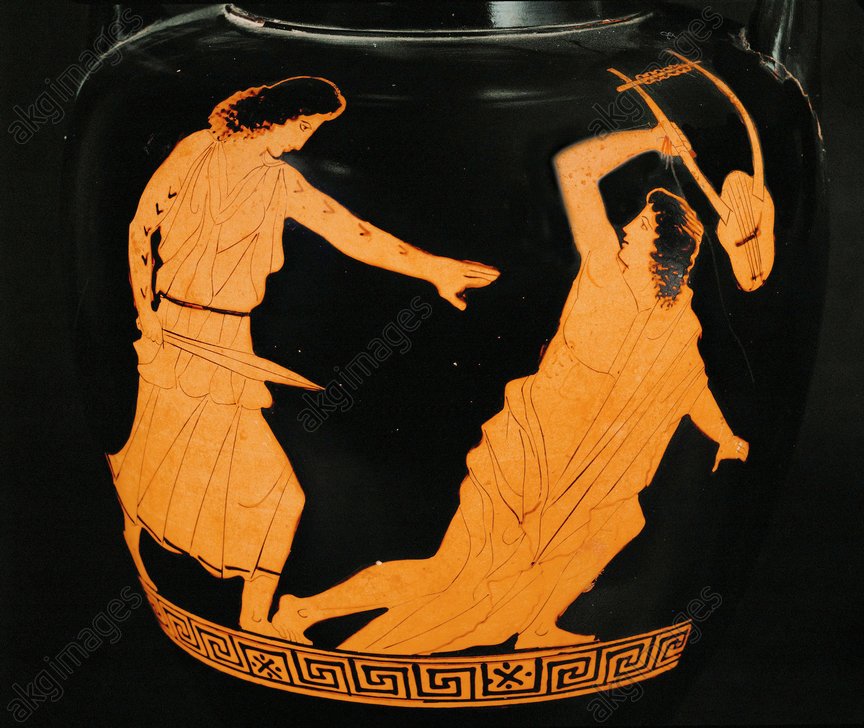
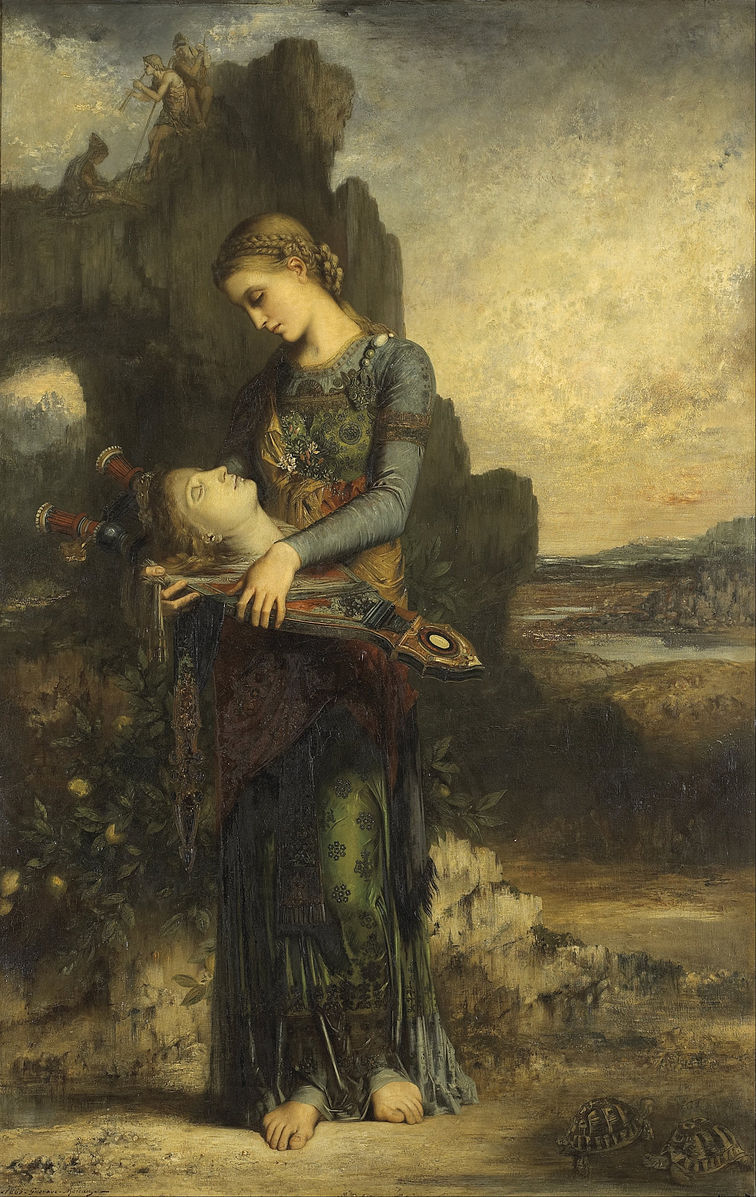
L: Maenad killing Orpheus (Attic red-figure amphora, ca. 450 BCE); R: Moreau, Orpheus (1865)
Baz Luhrmann's Moulin Rouge Trailer (2001): https://www.youtube.com/watch?v=LVLjp3_MQIw
Anaïs Mitchell's Hadestown Broadway Trailer (2019): https://www.youtube.com/watch?v=uWDwy2lAFFo
Sarah Ruhl's Eurydice (2003), American Players Theatre production: https://americanplayers.org/plays/eurydice
The Herd's (featuring Peter Frampton) "From the Underworld" (1967): https://www.youtube.com/watch?v=323lYSPDbyQ (lyrics)
Group Presentations
Groups








_-_Biblis_(1884).jpg)






